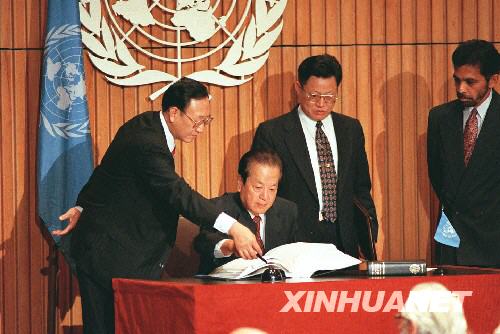
Chinese Vice Premier and Foreign Minister Qian Qichen signs the Comprehensive Nuclear Test Ban Treaty (CTBT) on September 24, 1996.
On April 16, the Chinese Ministry of Defense released a white paper that mentioned Chinese nuclear weapons but did not contain familiar language expressing China’s declaratory policy, particularly that China would never use nuclear weapons first, under any circumstances. This commitment to “no first use” has been a bedrock of Chinese nuclear weapons policy since the announcement was first made in 1964, immediately following China’s first nuclear weapons test. All previous white papers issued by the Chinese Ministry of Defense contained the language.
James Acton suggests the omission indicates China may be abandoning its long-standing commitment to no first use. It doesn’t. Eight days before the white paper was released, Chinese Councillor Zhang Junan repeated China’s commitment to no first use in an official statement to the United Nations Conference on Disarmament. Acton’s suggestion is based on the reasonable assumption that the change in the white paper “is almost certainly not the result of bureaucratic error.” But neither is Councillor Zhang’s statement to the UNCD. Moreover, Pang Sen, Director General of the Department of Arms Control of the Chinese Ministry of Foreign Affairs, made the following statement at the Second Preparatory Committee for the 2015 Review Conference of the Parties to the Treaty on the Non-Proliferation of Nuclear Weapons (NPT) on April 22:
“Nuclear weapons states should abandon the deterrence doctrine based on the first use of nuclear weapons. … China has adhered to the policy of no first use of nuclear weapons at any time or under any circumstances, and made the unequivocal commitment that we will unconditionally not use or threaten to use nuclear weapons against non-nuclear weapons states or nuclear weapons free zones.”
Readers should not mistake the use of the present perfect and past tense in the translation as a cause for concern. The original Chinese text is unambiguous and emphatic in its assertion that no first use has been “scrupulously” observed “from the start” and will continue to be “to the end” [始终恪守].
Unfortunately, while Mr. Acton pleads for greater U.S.—China dialog on nuclear weapons policy his op-ed perpetuates a fundamental misunderstanding that inhibits progress. Productive dialog on nuclear weapons issues between the United States and China requires a change of heart on both sides of the table. The United States needs to set aside its doubts about China’s commitment to no first use and China should stop insisting the United States adopt the same policy. Continuing to make no first use the focus of the talks will only condemn them to continued failure.
